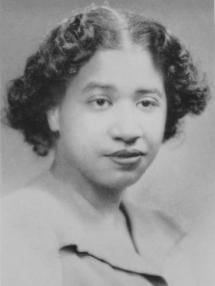Abstract
Elizabeth “Betty” Branch Jackson is one of Pembroke’s early students of color. During her time on campus, she was the only Black student for over two years, but this did not stop her from being extremely active during her time there and in the years following. Jackson worked for the American Friends Service and received a National Urban League Fellowship to pursue an MSW at the University of Pittsburgh. She joined the Student Nonviolent Coordinating Committee, continuing her interest in social activism.
In Part 1 of this interview, Elizabeth Branch Jackson begins by talking about her high-achieving family. Educated at Howard Dental School, her father was one of only two Black dentists in Providence at that time. He was also active in the NAACP and a variety of community programs, pushing the same expectations he had for himself onto his daughter. Jackson discusses the inevitability of pursuing a Ph.D., her lack of choice in choosing Pembroke, and being a highly visible token among her classmates. She explains her experience interacting with white people who were uncomfortable around her, feeling like a second class citizen as a “city girl,” and her brief stint in the dormitories. Outside of those social experiences, she remembers participating in Question Club, the Young Women’s Christian’s Association, and in a number of community service leagues. She goes on to discuss influential factuly members, namely Dean Margaret Shove Morriss who encouraged her to get away from home before going to graduate school, and Professor Buckley, her unforgettable sociology professor.
In Part 2, Jackson discusses her life after Pembroke. Her first year was spent in Philadelphia, where she worked for the American Friends Service Committee for nine months. Afterward, she received her MSW from the University of Pittsburgh, where she had a tense relationship with her advisor. Then she explains her time spent as a community Organizer, working in Chicago, transitioning to her position at Wayne State University, meeting her husband, and the boredom of maternity leave. She elaborates, continuing to speak about her father, Lighted School House Programs, and her work with the Red Cross.
In Parts 3 and 4, Jackson recalls the difficulty of juggling her various responsibilities, and her daughters’ insistence that she was neglectful. She discusses her subsequent reevaluation of her life, and her election to the Brown Corporation as a Trustee. In this position, and in her marriage, Jackson explains that she felt she had different, invaluable life experiences. She talks about her integrated life as well as the segregation and oppression that she sometimes felt. She ends by contemplating that the impact of racism and sexism was acted out in very different ways by her parents, her husband, and herself.
Part 1
Part 2
Part 3
Part 4
Recorded on October 30, 1987 in Detroit, MI
Interviewed by Dorcey Baker
Suggested Chicago style citation: Jackson, Elizabeth Branch. Interview. By Dorcey Baker . Pembroke Center Oral History Project, Brown University. October 30, 1987.
Biography
Elizabeth “Betty” Branch Jackson is one of Pembroke’s early students of color. During her time on campus, she was the only Black student for over two years, but this did not stop her from being extremely active during her time there and in the years following. Jackson worked for the American Friends Service and received a National Urban League Fellowship to pursue an MSW at the University of Pittsburgh. She joined the Student Nonviolent Coordinating Committee, continuing her interest in social activism. Taking positions with institutions such as the Red Cross and the Council for Community Services, Jackson finally took a teaching position at Wayne State University. Even in retirement, she continued her involvement with politics and education, both locally and in relation to Brown University.
